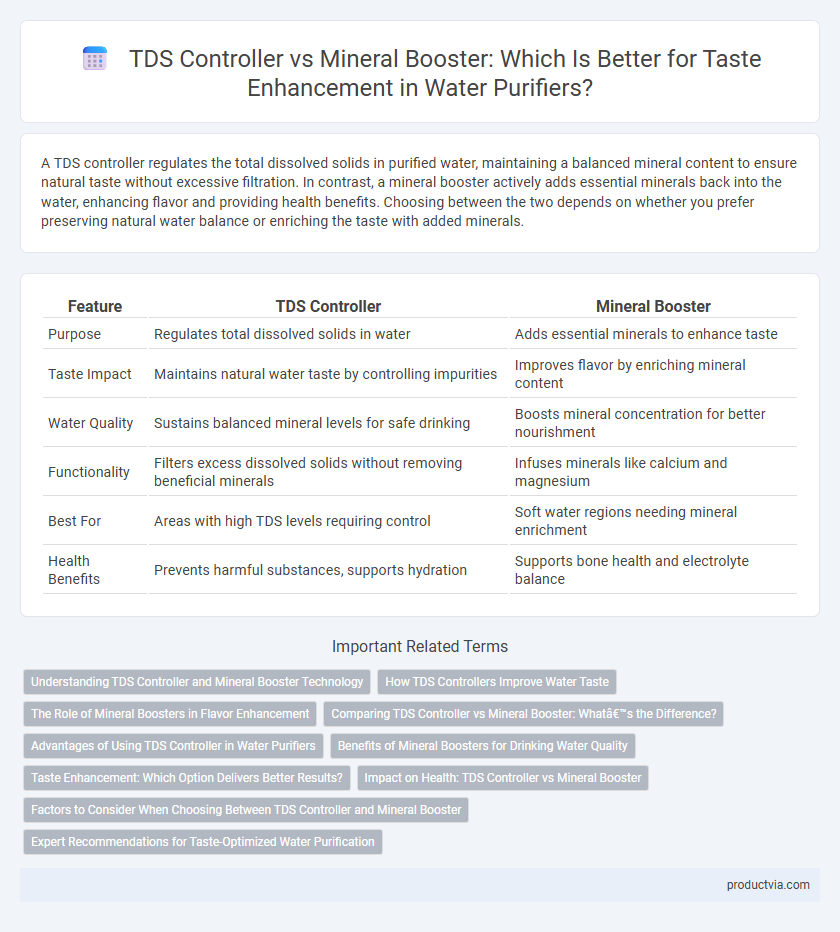A TDS controller regulates the total dissolved solids in purified water, maintaining a balanced mineral content to ensure natural taste without excessive filtration. In contrast, a mineral booster actively adds essential minerals back into the water, enhancing flavor and providing health benefits. Choosing between the two depends on whether you prefer preserving natural water balance or enriching the taste with added minerals.
Table of Comparison
| Feature | TDS Controller | Mineral Booster |
|---|---|---|
| Purpose | Regulates total dissolved solids in water | Adds essential minerals to enhance taste |
| Taste Impact | Maintains natural water taste by controlling impurities | Improves flavor by enriching mineral content |
| Water Quality | Sustains balanced mineral levels for safe drinking | Boosts mineral concentration for better nourishment |
| Functionality | Filters excess dissolved solids without removing beneficial minerals | Infuses minerals like calcium and magnesium |
| Best For | Areas with high TDS levels requiring control | Soft water regions needing mineral enrichment |
| Health Benefits | Prevents harmful substances, supports hydration | Supports bone health and electrolyte balance |
Understanding TDS Controller and Mineral Booster Technology
TDS Controller technology maintains optimal Total Dissolved Solids levels by regulating essential minerals in purified water, ensuring a balanced taste without compromising purity. Mineral Booster technology enhances water flavor by reintroducing vital minerals like calcium and magnesium after filtration, improving both taste and health benefits. Comparing both, TDS Controllers focus on stabilizing mineral concentration for consistent taste, while Mineral Boosters actively enrich water with specific minerals to enhance flavor profiles.
How TDS Controllers Improve Water Taste
TDS controllers improve water taste by maintaining optimal levels of Total Dissolved Solids, which helps preserve essential minerals that enhance flavor without compromising purity. Unlike mineral boosters that artificially add minerals, TDS controllers selectively retain beneficial ions, ensuring naturally balanced taste profiles. This precise regulation results in fresher, more natural-tasting water, appealing to consumers seeking both health benefits and superior taste.
The Role of Mineral Boosters in Flavor Enhancement
Mineral boosters in water purifiers enhance taste by reintroducing essential minerals like calcium and magnesium removed during purification, resulting in richer, more natural water flavor. Unlike TDS controllers that only regulate total dissolved solids levels without differentiating mineral types, mineral boosters selectively restore beneficial elements crucial for balanced water taste. This targeted mineral restoration improves mouthfeel and overall drinking experience, making mineral boosters key for flavor enhancement in purified water systems.
Comparing TDS Controller vs Mineral Booster: What’s the Difference?
TDS Controller maintains optimal Total Dissolved Solids in purified water by balancing essential minerals without altering the original composition, ensuring natural taste retention. Mineral Booster adds specific essential minerals like calcium and magnesium to enhance flavor, often improving water's alkalinity and health benefits. While TDS Controller focuses on stabilizing mineral content for balanced taste, Mineral Booster actively increases mineral levels to enrich both taste and nutritional value.
Advantages of Using TDS Controller in Water Purifiers
TDS Controller in water purifiers maintains essential dissolved solids, preserving natural water taste and beneficial minerals, unlike Mineral Boosters that add artificial elements. It enhances water purity by selectively regulating total dissolved solids, ensuring healthier, more natural-tasting water without compromising essential minerals. This precise control improves overall water quality, supporting better hydration and safer consumption.
Benefits of Mineral Boosters for Drinking Water Quality
Mineral boosters improve drinking water quality by adding essential minerals like calcium and magnesium, which enhance taste and promote health. Unlike TDS controllers that only regulate total dissolved solids, mineral boosters actively enrich water with beneficial elements, ensuring better mineral balance. This results in fresher, more natural-tasting water that supports hydration and overall well-being.
Taste Enhancement: Which Option Delivers Better Results?
TDS controllers regulate the total dissolved solids in water, maintaining a balanced mineral content that preserves the natural taste, while mineral boosters add specific essential minerals to enhance flavor intensity. Water purifiers equipped with TDS controllers typically deliver a more consistent and natural taste by preventing over-mineralization, whereas mineral boosters can tailor the water's flavor profile to individual preferences. For optimal taste enhancement, TDS controllers often provide better results by ensuring water retains its authentic and refreshing qualities.
Impact on Health: TDS Controller vs Mineral Booster
A TDS Controller maintains optimal Total Dissolved Solids levels in purified water, ensuring the water retains essential minerals without harmful contaminants, which supports balanced hydration and overall health. A Mineral Booster enriches purified water by adding essential minerals such as calcium and magnesium, enhancing taste and providing additional nutritional benefits that promote bone health and muscle function. Both technologies improve water quality but a TDS Controller focuses on maintaining safe mineral levels, while a Mineral Booster actively enhances mineral content for better health outcomes.
Factors to Consider When Choosing Between TDS Controller and Mineral Booster
When selecting between a TDS controller and a mineral booster for water purifier taste enhancement, consider the initial water quality and TDS levels, as a TDS controller stabilizes dissolved solids while a mineral booster adds essential minerals often removed during purification. Water source compatibility, maintenance frequency, and specific health requirements also play crucial roles; TDS controllers work best with high-quality input water, whereas mineral boosters benefit water lacking essential minerals. Evaluating energy consumption, device compatibility with existing purifiers, and cost-effectiveness ensures optimal taste improvement aligned with user preferences.
Expert Recommendations for Taste-Optimized Water Purification
Experts recommend using a TDS controller in water purifiers to maintain optimal Total Dissolved Solids levels, ensuring balanced mineral content for natural taste enhancement without over-purification. Mineral boosters add essential minerals like calcium and magnesium to improve water flavor, but precise TDS management better preserves the water's original taste profile. Combining TDS control with mineral supplementation offers the best approach for taste-optimized purified water.
TDS Controller vs Mineral Booster for taste enhancement Infographic

 productvia.com
productvia.com